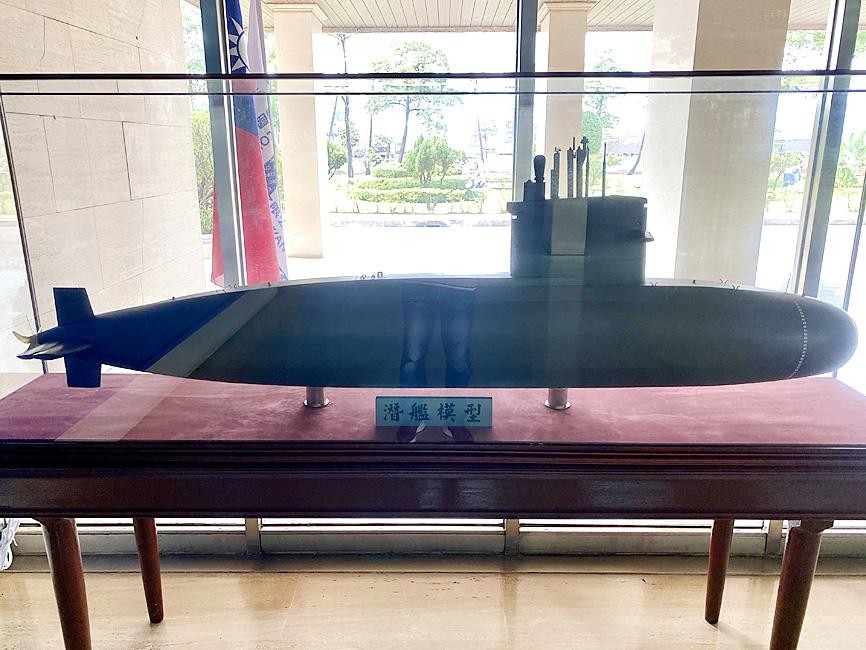Pending the successful completion of the nation’s first indigenous submarine in September next year, the Executive Yuan might allocate a budget of as much NT$300 billion (US$10 billion) for seven additional submarines, a source said.
The military’s medium and long-term plans call for eight submarines to meet defense needs, so the government is keen to get started on additional submarines if the first one passes tests, the source said, adding that the legislature would need to approve the budget.
The budget for the first submarine, codenamed the Haichang Project, was NT$49.3 billion to be spent from 2019 to 2025 for expenses including manufacturing and hardware.

Photo: Hung Chen-hung, Taipei Times
The exact cost of the proposed seven submarines would depend on the exchange rate, raw material prices, procurement costs and other factors, the source said.
However, given that facilities are already in place, the additional submarines are expected to cost less than the first unit, the source said, adding that the facilities can accommodate simultaneous construction and maintenance operations for three submarines.
Six pressure hull sections and sail cover sections of the first unit are complete, and the completed sections have passed strength testing, the source said.
Several pieces of “red zone equipment,” such as the sonar system, have also been procured, and the torpedo tubes have been installed for testing, the source said.
Forty officers from the navy’s 256th Submarine Squadron are on hand at CSBC Corp, Taiwan (台船) facilities where the submarine is being built, studying the vessel’s operation, and preparing for handover and testing, the source said.
“They are assisting the engineers with the construction process, and they will be the seeds of the submarine program that will go on to train others,” the source said.
Democratic Progressive Party Legislator Wang Ting-yu (王定宇) on Tuesday said that the production of additional submarines would be easier, but added that the procurement of components from overseas would depend on foreign authorities.

Taiwanese actress Barbie Hsu (徐熙媛) has died of pneumonia at the age of 48 while on a trip to Japan, where she contracted influenza during the Lunar New Year holiday, her sister confirmed today through an agent. "Our whole family came to Japan for a trip, and my dearest and most kindhearted sister Barbie Hsu died of influenza-induced pneumonia and unfortunately left us," Hsu's sister and talk show hostess Dee Hsu (徐熙娣) said. "I was grateful to be her sister in this life and that we got to care for and spend time with each other. I will always be grateful to

REMINDER: Of the 6.78 million doses of flu vaccine Taiwan purchased for this flu season, about 200,000 are still available, an official said, following Big S’ death As news broke of the death of Taiwanese actress and singer Barbie Hsu (徐熙媛), also known as Big S (大S), from severe flu complications, the Centers for Disease Control (CDC) and doctors yesterday urged people at high risk to get vaccinated and be alert to signs of severe illness. Hsu’s family yesterday confirmed that the actress died on a family holiday in Japan due to pneumonia during the Lunar New Year holiday. CDC Deputy Director-General Tseng Shu-hui (曾淑慧) told an impromptu news conference that hospital visits for flu-like illnesses from Jan. 19 to Jan. 25 reached 162,352 — the highest

TAIWAN DEFENSE: The initiative would involve integrating various systems in a fast-paced manner through the use of common software to obstruct a Chinese invasion The first tranche of the US Navy’s “Replicator” initiative aimed at obstructing a Chinese invasion of Taiwan would be ready by August, a US Naval Institute (USNI) News report on Tuesday said. The initiative is part of a larger defense strategy for Taiwan, and would involve launching thousands of uncrewed submarines, surface vessels and aerial vehicles around Taiwan to buy the nation and its partners time to assemble a response. The plan was first made public by the Washington Post in June last year, when it cited comments by US Indo-Pacific Commander Admiral Samuel Paparo on the sidelines of the Shangri-La Dialogue

Suspected Chinese spies posing as Taiwanese tourists have been arrested for allegedly taking photographs of Philippine Coast Guard ships, local media reported. The suspected spies stayed at a resort in Palawan, where from a secluded location they used their phones to record coast guard ships entering and leaving a base, Philippine TV network GMA said on Wednesday. Palawan is near the Spratly Islands (Nansha Islands, 南沙群島) and other disputed areas of the South China Sea, where tensions have been on the rise between China and the Philippines. The suspects allegedly also used drones without permission and installed cameras on coconut trees in the